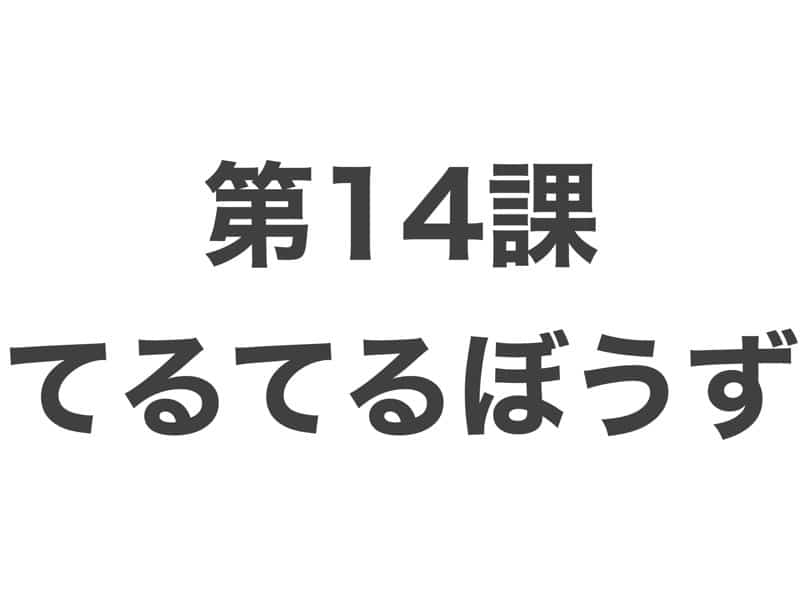新しい言葉
| 予測する | To predict, to forecast |
| 〜上で | In terms of, in the context of |
| 欠かせない | Indispensable, essential |
| いとなみ | Activity, occupation |
| 〜次第 | Depending on, as soon as |
| 収穫する | To harvest |
| 命 | Life |
| めずらしい | Rare, unusual |
| 法則 | Law, principle, rule |
| 流れ | Flow, stream |
| 向き | Direction, orientation |
| 観察する | To observe |
| 調和する | To harmonize |
| 各地 | Various places, each area |
| 各 | Each, various |
| 夕焼け | Sunset glow |
| とける | To melt, to dissolve |
| 農作業 | Farm work, agricultural work |
| 言い伝え | Legend, folklore, saying |
| 当てになる | Reliable, dependable |
| 知恵 | Wisdom, knowledge |
| 神 | God |
| いのる | To pray |
| てるてるぼうず | Teru teru bozu (a traditional Japanese charm for good weather) |
| 〜とともに | Together with, along with |
| 気象 | Weather, climate |
| 観測する | To observe, to measure |
| 進歩する | To advance, to progress |
| なくてはならない | Absolutely necessary, essential |
| 数時間 | Several hours |
| 数時間後 | A few hours later |
| 時期 | Season, period |
| 日取り | Date, schedule |
| 〜にもかかわらず | Despite, although |
| 異常な | Abnormal, unusual |
| 洪水 | Flood |
| 引き起こす | To cause, to bring about |
| かけがえのない | Irreplaceable, precious |
| うばう | To take away, to deprive |
| よごす | To pollute, to dirty |
| 手におえない | Beyond one’s control, unmanageable |
| あわてる | To panic, to be flustered |
| したがう | To follow, to comply with |
| 見直す | To reconsider, to review |
いっしょに考えましょう
- Are you interested in the weather forecast?
- What seasons are there in the place where you grew up?
- What is the best season?
読みましょう
Predicting the weather and seasonal changes has been an essential activity for humans to continue their daily lives. The harvests could be affected by the weather, and it was not uncommon for people to lose their lives while searching for food in the mountains or the sea. To understand the rules of nature, people observed the color of the sky, the movement of clouds, the direction of the wind, and the temperature of the soil and water, living in harmony with nature.
Even now, various sayings remain throughout Japan, such as “the day after a sunset will be sunny” and “when the snow melts to a certain point in the mountains, it’s time to start farming.” While these sayings are often unreliable, they are teachings that have gathered the experiences and wisdom that humans have learned from nature over a long period. Additionally, people sometimes prayed to the gods for a good harvest in autumn and made “teru teru bozu” to wish for good weather the next day.
The first weather forecast in Japan was issued in 1884, and for some time, it was a simple prediction. However, with the advent of computers, meteorological observation technology has made significant advancements, and forecasts have become more accurate, now serving as indispensable information in daily life. By using the Internet, one can know the weather not only for the next few hours but also for the coming days. Today, people rely on forecasts to determine not only the timing of agricultural work and travel plans but also what to wear when going out and whether to carry an umbrella.
However, despite human efforts, abnormal weather patterns continue to occur around the world. Unseasonable typhoons cause floods and take precious lives. This is the result of ignoring the rules of nature, altering the landscapes of mountains and seas, and continuously polluting water and air. With the current forecasting technology, we are facing challenges that are beyond our control, leading to urgent statements like, “This is unlike anything we’ve experienced before.” Abnormal weather may be nature’s way of telling humanity to “reassess the current state of affairs.”
答えましょう
- Why is it essential to predict weather changes with the seasons?
- How have people lived to understand the rules of nature?
- What weather-related sayings and traditions exist throughout Japan?
- Besides sayings and traditions, what else have people done?
- When was the first weather forecast issued in Japan?
- What decisions do you make based on the weather forecast today?
- Why are extreme weather events occurring?
- What does the author say needs to be reconsidered?
使いましょう
まとめましょう
- How did people predict weather and seasonal changes in the past?
- How has this changed since the introduction of computers?
- What does the voice of nature tell us we should do?
話しましょう
- What sayings and traditions exist in the place where you grew up? Why do you think these sayings and traditions developed?
- What impact do extreme weather events have on our lives? What measures are being taken in response to these impacts?



コメント